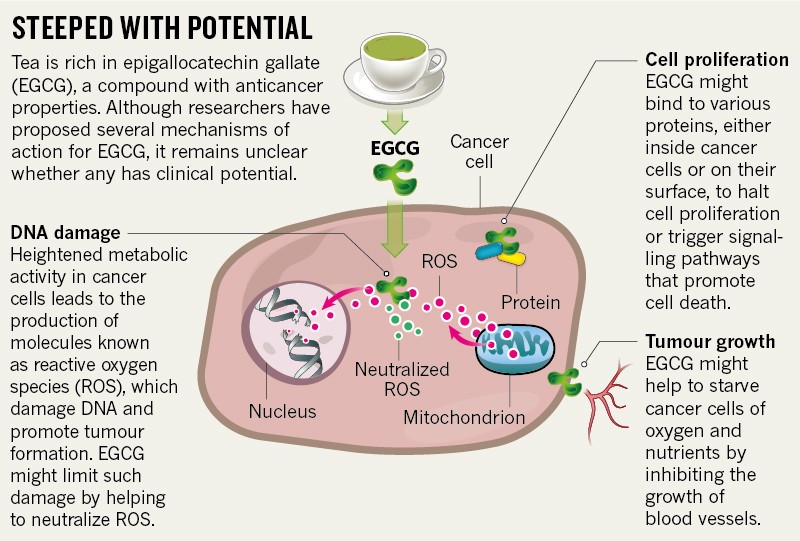
In terms of popularity as a beverage, tea comes second only to water. In many parts of the world tea is the drink of choice, not only in homes but also at social gatherings. Green tea is the dried product of the plant Camellia sinensis. Depending upon the level of processing, tea is sold as green, white, black and oolong. Green tea and white tea are less processed. Green tea is known to have excellent health benefits including cancer prevention.
Constituents of Green Tea
The catechins, a kind of polyphenols, are the main health promoting constituents of green tea. Green tea consists of catechins like epigallocatechin-3-gallate or EGCG, epigallocatechin or EGC, epicatechin-3-gallate and epicatechin. These polyphenols serve as antioxidants, which means they quench free radicals.
Green Tea as an Antioxidant
Free radicals are reactive oxygen species that damage the cells and DNA in the human body. The level of free radicals shoots up as the age of the individual increases. Elevated levels of free radicals are a major risk factor for age-related health problems. Free radicals damage DNA and thereby lead to cancer.
The constituents of green tea serve as scavenging agents of free radicals and prevent cancer. Of all the catechins in green tea, EGCG is the most powerful antioxidant. These catechins also quench free metal ions, which are a key source of free radicals as they cause oxidation.
How Green Tea Prevents Cancer?
Animal studies suggest that tea exerts its effect on cancer through three possibilities
- Decreases cell proliferation. Increased cell proliferation drives cancer progression. The more the cancer cells grow rapidly the quicker the cancer spreads.
- Increases cancer cell death.
- Suppresses blood vessel growth in cancer. Like any other organ in the human body, cancer also needs nourishment. Cancer develops it own blood vessels to access nutrients and wash away wastes. Green tea prevents blood vessel spread in tumor.
Research on Green Tea and Cancer
Scientific data available on cancer prevention studies on animals are very impressive. Scientists treat either tumor bearing animals or cancer cells with green tea extract or black tea or tea polyphenols or EGCG, and analyse the outcome. Most of these studies suggest green tea acts as a cancer prevention agent. Animal models of lung, oral-digestive tract, colon and prostate cancer all showed beneficial effects of green tea or its constituents against cancer.
Reports also show that green tea selectively activates or inactivates certain genes in cancer cells. Of course, there is no guarantee if some drug works in animal models it should also show a similar effect in humans. Moreover, the quality and quantity of green tea and its constituents used in animal experiments may not always reflect the same level humans consume on a daily basis.
At least so far, the results of human studies on the effect of green tea on cancer are mixed and inconclusive. Some studies show positive effect and some not. A Japanese study reports consumption of ten cups of tea every day could prevent cancer. This study also suggested a synergistic effect of tea when supplemented with a cancer preventive drug. Another study showed that consumption of 600mg of green tea catechins daily for 12 months during early stages of prostate cancer arrested further growth of cancer. Studies also suggest factors like smoking, alcohol consumption and genetics influence the effectiveness of tea on cancer.
